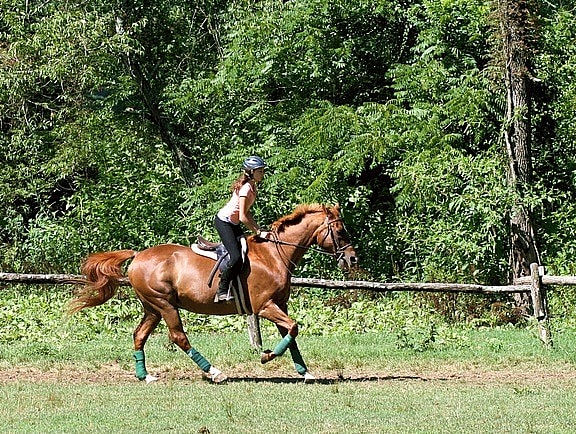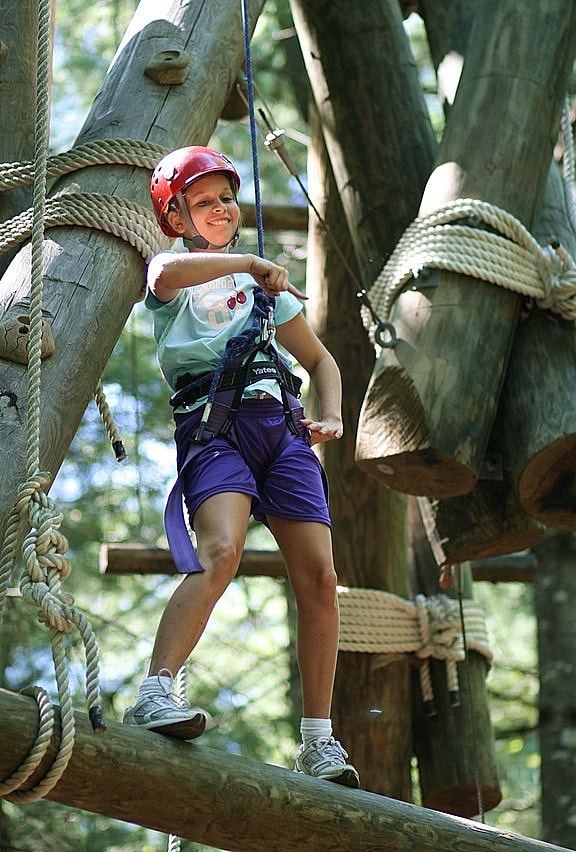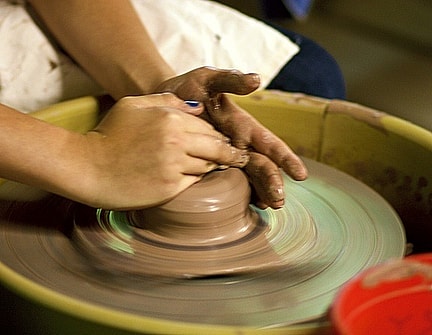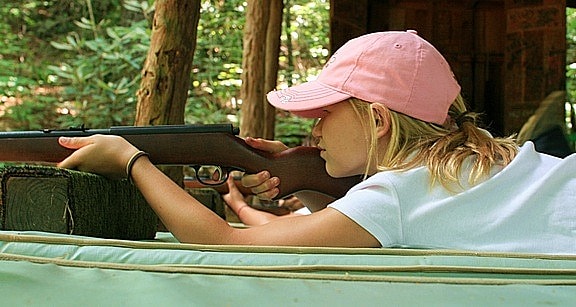After you feel comfortable controlling your horse in a walk, and learning to post while trotting your horse, the next step is to learn how to canter. The canter is a 3-beat riding movement of a horse that is faster than a trot but slower than a gallop. It’s a very natural gait where the first beat you hear is either the left or right hind leg. The second beat is the opposite hind leg and its opposite fore leg together, and the final beat is the fore leg opposite the first beat. Riding the canter involves the hips moving forward and backward slightly while keeping the rider in the saddle. It’s kind of a back and forth sweeping motion rather than an up and down motion like when you post. One important tip is to not pull on the reins for balance; this makes it more difficult for your horse to more forward as he needs. There are lots of types of canter to learn as well (“working,” “collected,” and “extended” for example), but in any case its great fun to learn this technique as you develop your horse riding skills at camp.
Month: December 2008
Vintage Postcards of Camp
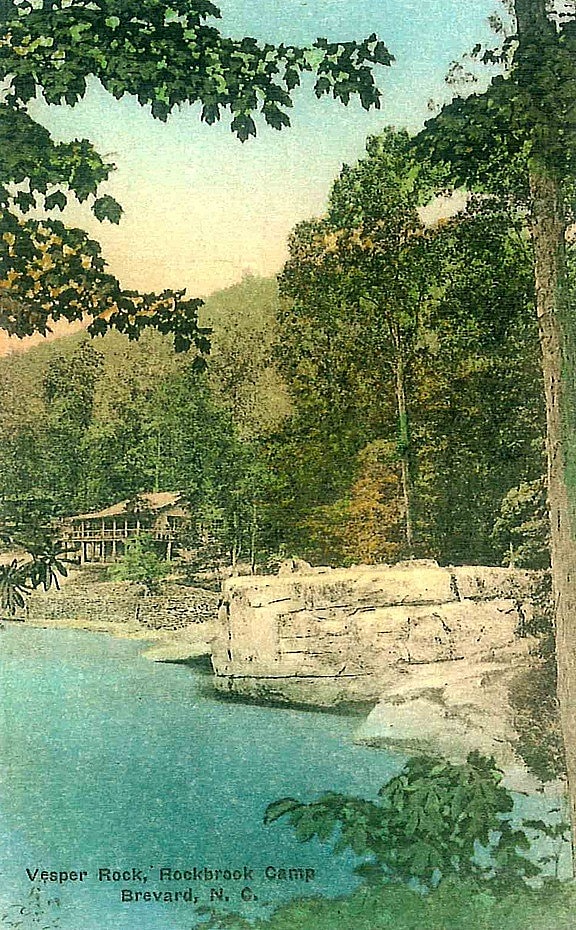
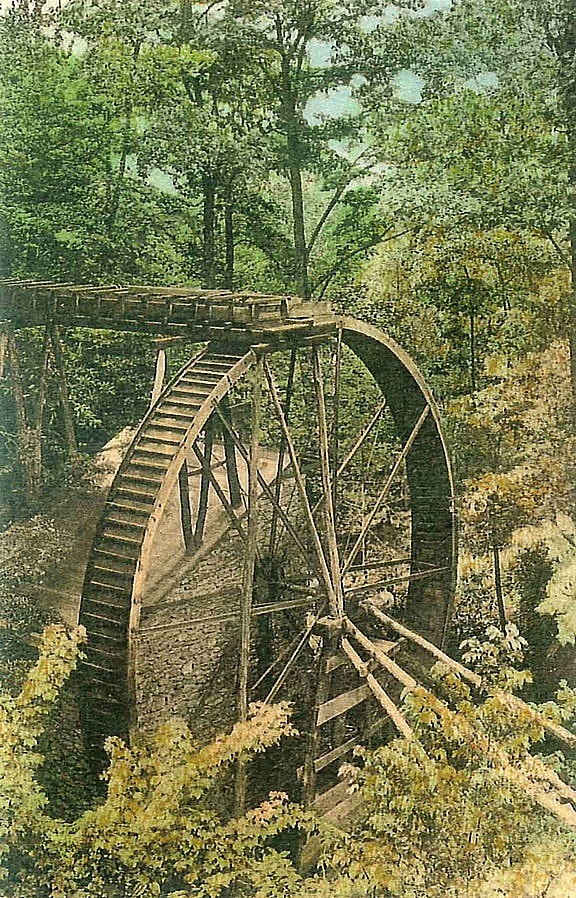
Here are two more vintage postcards showing the historic character of our North Carolina camp. Like the others we’ve posted, the Albertype Company produced these postcards in the 1930s. The first is a view of Vesper Rock looking out across the camp lake, and in the background you can see the Lakeview Lodge. The second card is even cooler because it shows what the Carrier’s (Rockbrook’s original owners) waterwheel looked like. It was dismantled many years ago leaving only the stone foundation which you can just barely spot down in the woods below the lake. Wouldn’t it be cool to rebuild it? Maybe someday we will!
P.S. Want to see more historic photos of camp, including another view of the waterwheel? Check out these.
Rockbrook Camp’s Ropes Course
“Does Rockbrook have a ropes course?”
Yes, we have an Alpine Tower. This is a special challenge course camp structure that combines both low ropes course elements and really cool high ropes course events. If you haven’t seen one of these, they are amazing. From this photo you can see a little that they are made of huge telephone poles bolted and lashed together in the shape of two inverted pyramids. This allows the youth girls to climb up three different sides, swing on ropes, balance on logs, scramble up cargo nets, and pull up on all sorts of climbing holds. There’s the “corporate ladder,” the “missing link,” the “swinging logs,” and the “bump out” to name just a few of the ropes course climbing elements on the Tower. You can imagine how popular climbing is at camp, and with all these different ways to climb, girls can come back all the time and have something new to try.
P.S. Did you know Rockbrook’s Alpine Tower is unique among youth camps because it is the only one with a roof?!
Kids Gotta Love S’mores!
Let’s talk s’mores… Don’t you just love ’em? You know how to make them. Take two graham crackers and a piece of plain milk chocolate, roast a marshmallow on a stick over a fire, and make a chocolate marshmallow sandwich with the graham crackers. Some people like their marshmallow golden brown and gooey, while others are fine burning the marshmallow a little bit to make a charred skin. Either way, they are an excellent sweet treat out around the campfire and one of every kid’s favorite outdoor activities.
Did you know that nobody knows for sure who invented s’mores? The first recorded recipe appears in a Girl Scout book called Tramping and Trailing published in 1927, but s’mores were certainly around before that. For example, Moon Pies, which are also made of a cracker, marshmallow and chocolate, were first produced in 1917. It’s a bit of a mystery, but it’s fun to think that making s’mores has been an outdoor activity kids have enjoyed at Rockbrook since the very beginning.
How to Make Wheel-Thrown Ceramics
“Can you learn how to use the potter’s wheel?”
Yes, you can! The Rockbrook ceramics camp activities let campers improve their pottery skills so they can learn to throw pots on the wheel. After practicing other ceramics techniques, specifically hand-building methods like pinch, coil and slab pottery, it’s exciting to learn about the potter’s wheel.
Like any skill, this takes practice, but to get started you’ll work on 4 key steps:
- Centering the clay on the wheel.
- Opening up the center of the clay.
- Pulling up the walls and shaping the piece.
- Trimming the base of the piece.
Of course there’s lots of detail to each of these steps, but this brief outline gives you a sense of what’s involved in learning to throw ceramics on the potter’s wheel. Real art! Over a few weeks at camp, you’ll be surprised how good you can get and be amazed at the cool things you can make. Maybe next summer, you can finish a whole set of matching mugs!
P.S. If you want to read more about it, check out the book Wheel-Thrown Ceramics, by our friend Don Davis. It’s the best one around.
Camp Nurse Jobs
Speaking of nurses and nursing, in particular camp nurses, we want to remind everyone that Rockbrook will be hiring nurses again for this summer’s camp season. We hire nurses for each of our sessions, for 2-, 3-, or 4-week terms. Accepting one of the nursing positions is one of the best ways to experience summer camp as an adult, work with happy engaged children, and get to know this area of North Carolina.
Benefits of Camp Nursing
Being a camp nurse is a wonderful way to experience camp life, to spend time outdoors, to work with amazing people, and to compliment so many of your nursing skills. It’s a chance to join the camp community, make lots of friends, and enjoy a special place for a few weeks of your summer. Just like the campers, odds are you’ll love camp and you’ll want to come back summer after summer.
How to Apply
If you, or someone you know, might be interested in one of our camp nurse jobs, please let us know. We’d love to tell you more about it.
Shooting Guns at Camp? Yikes!
Sometimes parents are a little surprised to learn that the girls at camp learn to shoot rifles. We’ll sometimes hear, “Are those real guns?” They sure are! While our youngest girls will use “youth” rifles, everyone shoots real .22 caliber guns. This means the bullets are small 22/100ths of an inch in diameter. We also use the lowest power .22 ammunition, the “short” rimfire version. These are the perfect choice for target shooting, particularly on our youth range (25 meters or about 82 feet to the target).
Shooting is of course completely controlled and supervised at camp. The guns and ammunition are always locked and stored separately. The riflery sport instructors are trained and NRA certified to operate a rifle range, and all of the campers are taught the proper safety protocols when they choose riflery for one of their activities. So yes, the guns and bullets are real, but we do everything we can to make sure it’s very safe.

